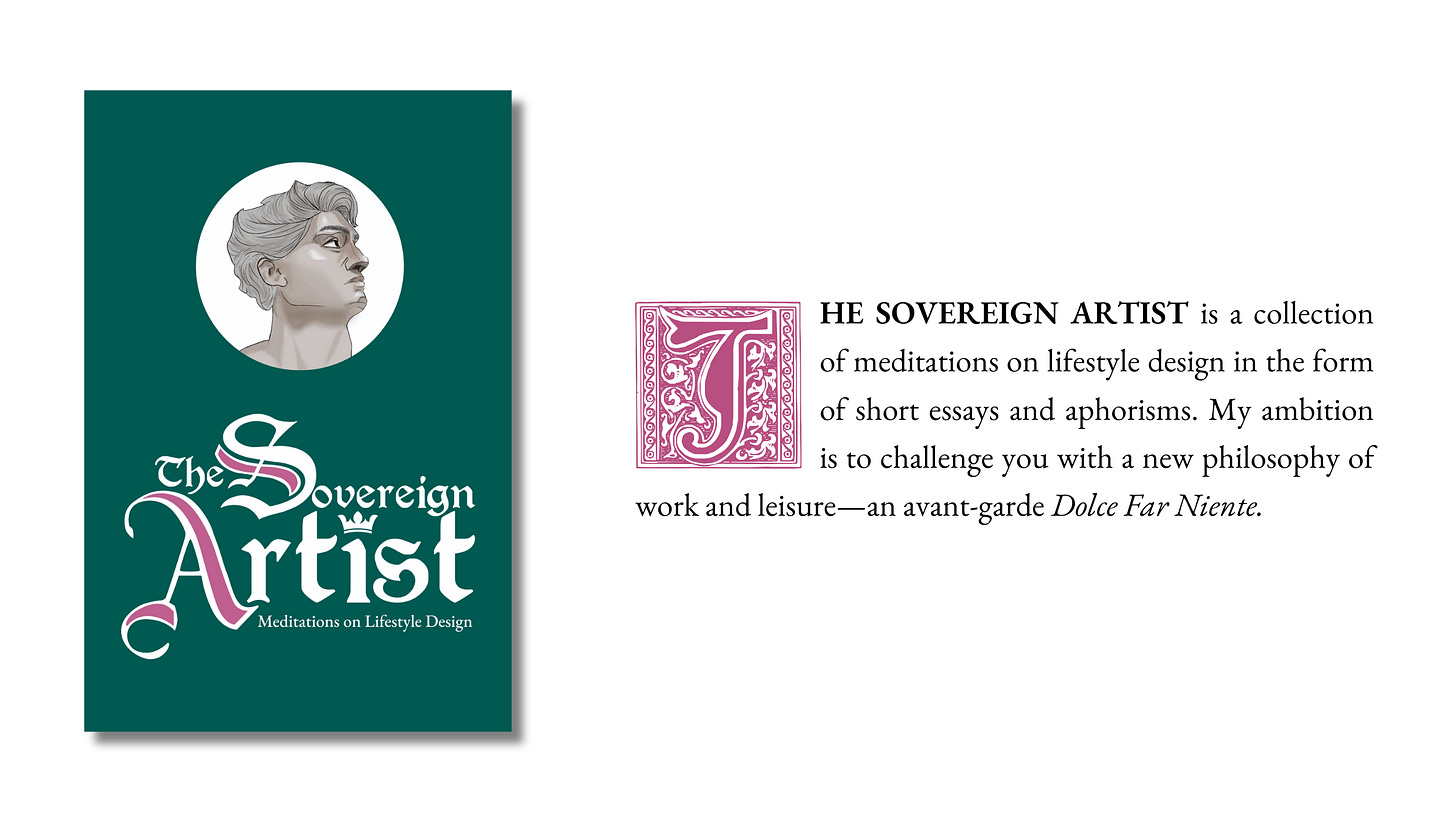Hello friends,
Vizi here. GM from Transylvania 🌅
I’m launching my book next week! I’ve been working on this project—at a leisurely pace and only when I felt inspired—for 5-7 years in total. I refused to consider this “work” and, as a result, everything felt like play. I hope you’ll enjoy reading it as much as I enjoyed writing it.
Here are 3 aphorisms and 1 essay from my book…
3 Aphorisms
I.
We read books to find out what we already know but find hard to express.
The expression of ideas, not ideas per se, is what we seek when reading books.
II.
You don’t suffer from stress because you’re doing stressful things; you suffer from stress because you allow yourself little to no time for silence and boredom.
You suffer from stress because you’re terrible at the art of doing nothing.
You’re in control of your life only if you can rest and relax without feeling any remorse.
H/T Ashwin Sharma
III.
My best thoughts came to me through revelation—while taking long walks in the countryside, sipping wine and watching the sun go down, or doing nothing on my balcony other than admiring the view.
Almost nothing of value ever came to me sitting at my desk, through the instrument of reason. My office helps me be productive—that’s indeed where the “hard” work gets done—but seldom creative.
Most ideas produced in my office are inevitably flawed, corrupted, and easy to dismantle.
The Courage to Live a Simple Life
HAVING ANALYZED a local shop owner, my mind got clear. She often wakes up around 5:00 AM, drinks a cup of coffee, prepares breakfast for her children, cleans up the house just enough to keep it in reasonable order, and goes to work around 7:30 AM…She’s been doing her job responsibly and cheerfully since she was a very young lady; she managed to maintain a good-enough relationship with her husband over many years despite periods of extreme difficulty; and even though she doesn’t come from a rich or supportive family, she’s been keeping her small business alive for more than a decade, invariably defying the corrupt, disgusting Romanian authorities that have tried to close it down multiple times.
Surveying my own life, I realized that I fall short of her, my power of handling daily life not being such. Although anyone has troubles—at home, at work, or inescapably existential—and she is no exception, she confronts them with great diligence and inner strength. The alchemy may lie in developing strong respect for the often unpleasant randomness of daily life. She’s a warrior invisible to the modern eye… She doesn’t fit the standard definition for what courage is supposed to look like. Courage for her is a habit, not a once-in-a-lifetime remarkable act. We are blind to the nuances of courage because we are brought up to only attribute it to the acts of a few historical figures.
Courage is much more about acting well in our daily challenges rather than extraordinary circumstances.
We need heroes and role models. We need people overflowing with ambition, success, and wealth. They inspire us. But do we take a moment to properly define what success or wealth means? Do we take a moment to grasp what exactly fuels their ambition? Many kings, queens, generals, and entrepreneurs deserve their reputation. Yet those who crafted the art of living—of coping with their daily challenges in a calm, sustained, and cheerful manner—deserve equal admiration and prestige.
To paraphrase Alain de Botton, “there’s immense skill involved in doing a fair business, raising your children to be reasonable adults,” taking care of your garden, maintaining a healthy body, or keeping your home clean and tidy—in doing all of these while staying sane and joyful. “Ordinary life is heroic in its own way,” he argues, “because ordinary tasks are far from easy to manage.”
There is much to learn from our lives if we decide to put on the right glasses and see that many of our ordinary activities hold, in fact, extraordinary qualities.
Montaigne came up with a striking observation I adapted for the purposes of this essay: “In practice, thousands of men and women had lived, in their villages, more gentle, more equable, and happier lives than many aristocrats we admire.” Being an aristocrat has nothing to do with your blood but your spirit. Marcel Proust spent plenty of time in his teens among dukes, duchesses, and princes only to realize how witless, boring, and full of vices they are. Aristocrats of the soul, to borrow Julius Evola’s expression, are scattered throughout society, invariant to social or wealth segmentation. And they silently lead a simple life in an extraordinary fashion.
It’s true that not every ordinary act is courageous. But there are many which we tend to ignore that are so. They’re impatiently waiting to be embraced and adopted, teaching everyone what courage looks like on a daily basis.
Wrapping up...
Hope you liked this episode!
Any feedback, suggestion, or criticism is welcome.
Thank you for your time,
Vizi Andrei
Host of The Sovereign Artist (Program)






